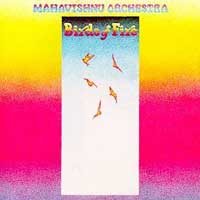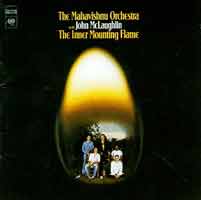| Hätte es nicht schon das erste Mahavishnu-Album The
Inner Mounting Flame gegeben, dann wäre wohl das 1973 erschienene Birds
Of Fire die herausragendste Jazz-Fusion-Platte aller Zeiten geworden. Beide
Platten sind stark geprägt von Sinnsuche und Erlösungsthematik.
Alles hier ist durchdacht und verströmt Sicherheit.
Die phantastischen Leistungen von Keyboarder Jan Hammer, dem Geiger Jerry
Goodman, dem Bassisten Rick Laird und dem Wahnsinns-Drummer Billy Cobham
werden nur noch übertroffen von der Übergitarre des Bandleaders
John McLaughlin. Hier bekommt man die ganze Palette seiner musikalischen
Einflüsse zu hören: Tal Farlow, Django Reinharts rasend-schnelle
Gitarrenläufe, Flamenco, Delta-Blues, schwerste verzerrte Metal-Gitarren,
Anleihen aus der indischen Musik und aus dem Folk. Alles ist hier versammelt
und vermischt sich zu einem edlen, kosmischen Gebräu.
(Peter Monaghan, Amazon.de-Redaktion)
|
|
Emboldened by the popularity of Inner Mounting Flame among rock audiences,
the first Mahavishnu Orchestra set out to further define and refine its
blistering jazz-rock direction in its second -- and, no thanks to internal
feuding, last -- studio album. Although it has much of the screaming rock
energy and sometimes exaggerated competitive frenzy of its predecessor,
Birds of Fire is audibly more varied in texture, even more tightly organized,
and thankfully more musical in content. A remarkable example of precisely
choreographed, high-speed solo trading -- with John McLaughlin, Jerry
Goodman, and Jan Hammer all of one mind, supported by Billy Cobham's machine-gun
drumming and Rick Laird's dancing bass -- can be heard on the aptly named
"One Word," and the title track is a defining moment of the
group's nearly atonal fury. The band also takes time out for a brief bit
of spaced-out electronic burbling and static called "Sapphire Bullets
of Pure Love." Yet the most enticing pieces of music on the record
are the gorgeous, almost pastoral opening and closing sections to "Open
Country Joy," a relaxed, jocular bit of communal jamming that they
ought to have pursued further. This album actually became a major crossover
hit, rising to number 15 on the pop album charts, and it remains the key
item in the first Mahavishnu Orchestra's slim discography.
(by Richard S. Ginell, All
Music Guide)
|

 Plattentipp
Plattentipp 



